Degradation ceremony - Study guides, Class notes & Summaries
Looking for the best study guides, study notes and summaries about Degradation ceremony? On this page you'll find 42 study documents about Degradation ceremony.
All 42 results
Sort by
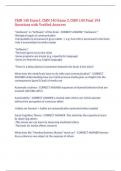 Popular
Popular
-
CMN 140 Exam1, CMN 140 Exam 2, CMN 140 Final 194 Questions with Verified Answers,100% CORRECT
- Exam (elaborations) • 35 pages • 2023
- Available in package deal
-
- $11.99
- 1x sold
- + learn more
CMN 140 Exam1, CMN 140 Exam 2, CMN 140 Final 194 Questions with Verified Answers "Hardware" vs "Software" of the brain - CORRECT ANSWER *Hardware:* -Biological organ of communication -Computation is processed in gray matter -> e.g. how info is processed in the brain -Info is transmitted via white matter *Software:* -The brain gives rise to the mind -Some programs are innate (e.g. capacity for language) -Some are learned (e.g. English language) *There is a deep physical connecti...
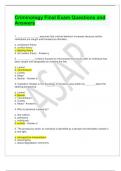
-
Criminology Final Exam Questions and Answers
- Exam (elaborations) • 39 pages • 2024
-
- $12.49
- + learn more
Criminology Final Exam Questions and Answers 1. ________________ assumes that criminal behavior increases because certain individuals are caught and branded as offenders. a. consensus theory b. conflict theory c. labeling theory d. left realism theory - Answer-c 2. _____________'s theory focused on the process that occurs after an individual has been caught and designated as violating the law. a. Lemert b. Tannenbaum c. Cooley d. Mead e. Becker - Answer-b 3. Outside...
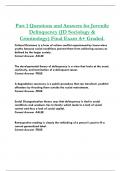
-
Part 1 Questions and Answers for Juvenile Delinquency (JD Sociology & Criminology) Final Exam A+ Graded.
- Exam (elaborations) • 17 pages • 2024
- Available in package deal
-
- $15.49
- + learn more
Part 1 Questions and Answers for Juvenile Delinquency (JD Sociology & Criminology) Final Exam A+ Graded.
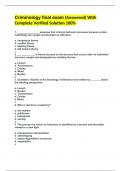
-
Criminology final exam (Answered) With Complete Verified Solution 100%
- Exam (elaborations) • 40 pages • 2024
-
- $15.99
- + learn more
Criminology final exam (Answered) With Complete Verified Solution 100% 1. ________________ assumes that criminal behavior increases because certain individuals are caught and branded as offenders. a. consensus theory b. conflict theory c. labeling theory d. left realism theory c 2. _____________'s theory focused on the process that occurs after an individual has been caught and designated as violating the law. a. Lemert b. Tannenbaum c. Cooley d. Mead e. Becker b 3. Outsider...
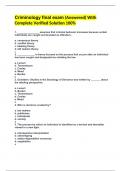
-
Criminology final exam (Answered) With Complete Verified Solution 100%
- Exam (elaborations) • 40 pages • 2024
-
- $12.49
- + learn more
Criminology final exam (Answered) With Complete Verified Solution 100% 1. ________________ assumes that criminal behavior increases because certain individuals are caught and branded as offenders. a. consensus theory b. conflict theory c. labeling theory d. left realism theory c 2. _____________'s theory focused on the process that occurs after an individual has been caught and designated as violating the law. a. Lemert b. Tannenbaum c. Cooley d. Mead e. Becker b 3. Outsider...
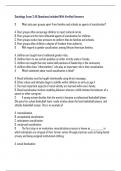
-
Sociology Exam 2 All Questions Included With Verified Answers
- Exam (elaborations) • 33 pages • 2024
-
- $21.79
- + learn more
Sociology Exam 2 All Questions Included With Verified Answers D What sets peer groups apart from families and schools as agents of socialization? A. Peer groups often encourage children to reject cultural norms. B. Peer groups are the most influential agents of socialization for children. C. Peer groups involve less pressure to conform than do families and schools. D. Peer groups allow children a degree of freedom from authority. D With regard to gender socialization, among African ...
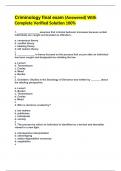
-
Criminology final exam (Answered) With Complete Verified Solution 100%
- Exam (elaborations) • 40 pages • 2024
-
- $15.49
- + learn more
Criminology final exam (Answered) With Complete Verified Solution 100% 1. ________________ assumes that criminal behavior increases because certain individuals are caught and branded as offenders. a. consensus theory b. conflict theory c. labeling theory d. left realism theory c 2. _____________'s theory focused on the process that occurs after an individual has been caught and designated as violating the law. a. Lemert b. Tannenbaum c. Cooley d. Mead e. Becker b 3. Outsider...
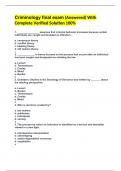
-
Criminology final exam (Answered) With Complete Verified Solution 100%
- Exam (elaborations) • 40 pages • 2024
-
- $15.98
- + learn more
Criminology final exam (Answered) With Complete Verified Solution 100% 1. ________________ assumes that criminal behavior increases because certain individuals are caught and branded as offenders. a. consensus theory b. conflict theory c. labeling theory d. left realism theory c 2. _____________'s theory focused on the process that occurs after an individual has been caught and designated as violating the law. a. Lemert b. Tannenbaum c. Cooley d. Mead e. Becker b 3. Outsider...

-
Juvenile Delinquency Final Exam! Questions Graded A+ With Correct Answers
- Exam (elaborations) • 5 pages • 2024
- Available in package deal
-
- $10.79
- + learn more
common interest is shared by the three schools of thought covered in Chapter 6? - ANS Share an interest in social power The ability to make things happen Produce the effect you want to produce Emerging from the civil unrest of the 1960s and early 70s, the labeling theory broadened theoretical explanations of juvenile delinquency (who formerly asked only the question "why do juveniles engage in delinquency") by considering what three additional questions (see page 155)? - ANS ...
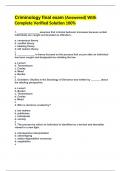
-
Criminology final exam (Answered) With Complete Verified Solution 100%
- Exam (elaborations) • 40 pages • 2024
-
- $8.99
- + learn more
Criminology final exam (Answered) With Complete Verified Solution 100% 1. ________________ assumes that criminal behavior increases because certain individuals are caught and branded as offenders. a. consensus theory b. conflict theory c. labeling theory d. left realism theory c 2. _____________'s theory focused on the process that occurs after an individual has been caught and designated as violating the law. a. Lemert b. Tannenbaum c. Cooley d. Mead e. Becker b 3. Outsider...

How did he do that? By selling his study resources on Stuvia. Try it yourself! Discover all about earning on Stuvia


